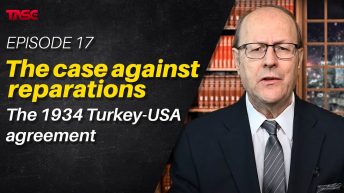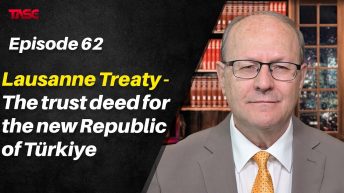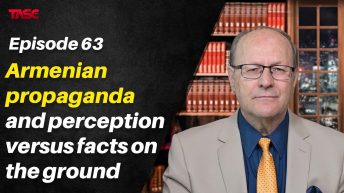In March, 2015, an email announcement appeared in my inbox. It said Stanford University’s Global Studies Division was offering a travel grant opportunity for students with an interest in human rights and/or conflict resolution.
The grantees would attend a conference in Istanbul, in April 2015. Nothing wrong with any of this, of course, until I read the next line which aroused deep feelings of disappointment, sadness, and resentment in me: “Project 2015: Armenian Genocide Centennial Commemoration.” Now if the announcement said “Turkish-Armenian conflict,” it would be factual, honest, and fair. So, I wrote back and asked SGS a simple question: How can you be so sure that it was genocide?
This simple but poignant question was posed by one of the presiding judges of the Grand Chamber of the European Court of Human Rights during the Perincek vs Switzerland trial to the lawyers defending the official Armenian narrative during the January twenty-eight, 2015 appeal hearings in Strasbourg. Project2015 was organized by Durde. Online research revealed that Durde is supportive of the PKK, the Kurdistan Workers’ Party, designated as a terrorist organization by Turkiye, the United States, and the European Union. DURDE uses any opportunity to disparage Turkiye and the alleged Armenian genocide was no exception.
The Stanford scholar responded by saying she has seen how arguments of sensitivity often subverted critical thinking. Hence this episode was created. I found that none of the 3 components of critical thinking were complied with in the claim that the 1915 events constitute a genocide.
- 1) EMOTIONAL COMPONENTS:
a) Valuing truth over self-interest: Reading Papazian’s 1934 book Patriotism Perverted, just the opposite seems to be true.
b) Accepting change: Has anyone heard of Armenians publicly condemning Armenian terrorism?
c) Empathizing: Check the reaction of the Armenian communities to murdered Turkish diplomats: gloating and arrogance.
d) Welcoming divergent views: Turkish point of view is not solicited or allowed and is always censored in genocide debates.
e) Tolerating ambiguity: The only toleration of ambiguity could be the use of the qualifier “alleged” before the genocide, which is not happening.
f) Recognizing personal biases: Just look at the comments in Armenian newspapers concerning Turks, Azerbaijanis and other Muslims. - 2) INTELLECTUAL COMPONENTS:
a) Thinking independently: If Project2015 truly supported the scholarly exploration of a controversial matter, it would name its conference “Turkish Armenian conflict”.
b) Defining problems accurately: How is that possible if genocide adherents insist on starting the clock in 1915?
c) Analyzing date for value and content: Most genocide proponents cannot read or write Ottoman Turkish and almost all of them ignore or dismiss Ottoman/Turkish archives.
d) Employing a variety of thinking processes in problem-solving: Here is one: How about emphasizing more academic research and scholarly debate?
e) Synthesizing: Is not happening as Armenian insurgency, terrorism, revolts, and treason are uncritically dismissed.
f) Resisting Overgeneralizations: The “official Armenian narrative” paints a simplistic, black-and-white picture of 1915 with Armenians as poor-starving-Armenians and Turks as mindless murderers.
g) Reflective thinking: Another missing link in the genocide advocates’ approach to the Turkish-Armenian conflict. - 3) BEHAVIORAL COMPONENTS of CRITICAL THINKING:
a) Delaying judgment until adequate data are available: a vast majority of the ottoman archives and almost all the Armenian archives have not been looked at.
b) Employing precise terms: Discovering precise shades of meaning is crucial in any genocide debate.
c) Gathering data: How can scholars gather data if the Turkish archives are open but shunned out of bias and Armenian archives are all but inaccessible?
d) Distinguishing fact from the opinion: Is the alleged Armenian Genocide an irrefutable fact, a belief, or an opinion?
e) Encouraging critical dialogue: Armenians systematically exclude the Turkish point of view in academic panels.
f) Listening actively: The few scholarly debates quickly decompose into shouting matches.
g) Modifying judgments in light of new information: Many scholars published their research work disputing the official Armenian narrative. How much of that enormous body of new information is used by genocide advocates?
h) Applying knowledge to new situations: How can one master this skill if one is constantly subjected to a drumbeat of flawed genocide narratives?
After analyzing all of the components, do you really think inviting students to a partisan project named “Armenian Genocide” conforms to the norms of critical thinking? Would not it be better to call it “alleged” Armenian Genocide? Or “disputed” genocide? Or enduring debate?




Add comment